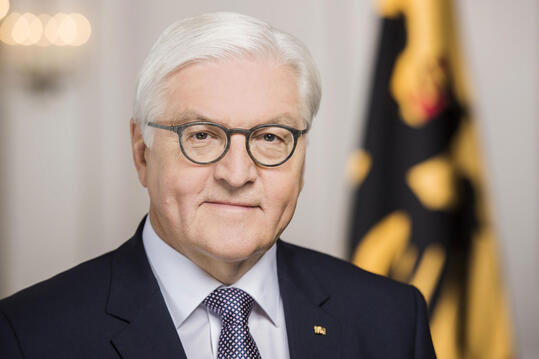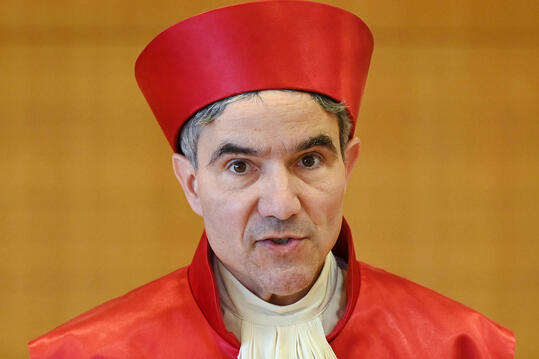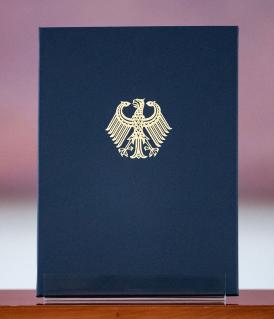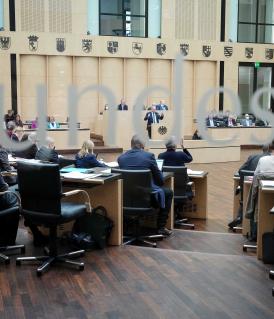How does the political system function in Germany?

The Federal Republic of Germany is structured as a federal state and parliamentary democracy. The Basic Law The Basic Law The Basic Law determines that Germany is a constitutional state: All state authorities are subject to judicial control. Section 1 of the Basic Law is of particular relevance. It stipulates that respect for human dignity is the most important aspect of the constitution: “Human dignity shall be… Read more › sets down that all state authority derives from the people. The people confer this power to the federal and state parliaments for one legislative period.
Separation of powers in Germany
State authority is divided between the legislative branch, the executive branch and the judicial branch, which is responsible for the administration of justice. The separation of powers is a core component of all democracies and is enshrined in Germany’s constitution, the Basic Law The Basic Law The Basic Law determines that Germany is a constitutional state: All state authorities are subject to judicial control. Section 1 of the Basic Law is of particular relevance. It stipulates that respect for human dignity is the most important aspect of the constitution: “Human dignity shall be… Read more › .
The legislative discusses, agrees on and amends laws that govern the way people live together in Germany. It also oversees the work of the government (executive).
The legislative includes
- the German Bundestag, which is the parliament elected by the people;
- the Bundesrat The Bundesrat The Bundesrat represents the federal states and alongside the Bundestag is a form of Second Chamber. It is obliged to deliberate on each federal law. As the chamber of the federal states, the Bundesrat has the same function as those Second Chambers in other federal states that are mostly referred… Read more › , which represents the 16 federal states Federal states Germany is a federal state. Both the central federal government and the 16 federal states have independent areas of jurisdiction. The government in Berlin is responsible for foreign policy, European policy, defense, justice, employment, social affairs, tax and health. The federal states are… Read more › at federal level. The Bundesrat The Bundesrat The Bundesrat represents the federal states and alongside the Bundestag is a form of Second Chamber. It is obliged to deliberate on each federal law. As the chamber of the federal states, the Bundesrat has the same function as those Second Chambers in other federal states that are mostly referred… Read more › plays a role in federal lawmaking;
- the Landtage, which are the parliaments of the 16 federal states
The executive enforces laws and implements them in daily life.
At federal level, the executive comprises
- the Federal Government ( Federal Chancellor Federal chancellor The Federal Chancellor is the only member of the Federal Government to be elected. The constitution empowers him to personally choose his ministers, who head the most important political authorities. Moreover it is the Chancellor who determines the number of ministries and their responsibilities… Read more › , federal ministers)
- the Federal President Federal President The Federal President is the head of state of the Federal Republic of Germany. He represents the country in its dealings with other countries and appoints government members, judges and high-ranking civil servants. With his signature, acts become legally binding. He can dismiss the government and,… Read more › (representative head of state with certain executive duties)
- the Federal Administration (ministries, federal agencies, Federal Police etc.)
At federal state level, it comprises
- the state-level governments (minister presidents and state-level ministers)
- state-level administrative bodies
At municipal level, it comprises
- mayors and district administrators
- city and district governments
The police force and administrative authorities (e.g. the inland revenue) also belong to the executive.
The judiciary is the branch that ensures that laws are upheld.
The judges who preside over the courts at federal and state level are independent and reach their decisions solely on the basis of the laws.
The highest German court is the Federal Constitutional Court The Federal Constitutional Court The Federal Constitutional Court is a characteristic institution of post-war German democracy. The Basic Law accorded it the right to repeal legislation passed as part of the legitimate democratic process should it come to the conclusion that such legislation contravenes the Basic Law. The… Read more › , which is the “guardian” of the Basic Law The Basic Law The Basic Law determines that Germany is a constitutional state: All state authorities are subject to judicial control. Section 1 of the Basic Law is of particular relevance. It stipulates that respect for human dignity is the most important aspect of the constitution: “Human dignity shall be… Read more › . All other state organs are bound by the verdicts reached by the 16 constitutional judges.
The Federal President Federal President The Federal President is the head of state of the Federal Republic of Germany. He represents the country in its dealings with other countries and appoints government members, judges and high-ranking civil servants. With his signature, acts become legally binding. He can dismiss the government and,… Read more › is for protocol purposes Germany’s most senior representative.
The Federal President is represented by the Bundesrat The Bundesrat The Bundesrat represents the federal states and alongside the Bundestag is a form of Second Chamber. It is obliged to deliberate on each federal law. As the chamber of the federal states, the Bundesrat has the same function as those Second Chambers in other federal states that are mostly referred… Read more › President – an office held on an annually rotating basis by a minister president of one of the 16 federal states.
For protocol purposes, the Bundestag The Bundestag The Bundestag is made up of the elected representatives of the German people. In principle elections to the Bundestag are proportionally representative, with each party’s share of the vote in the election reflecting the number of seats it occupies in the parliament. But the electoral system also… Read more › President ranks second-highest.
The office with the greatest scope for shaping policy is that of the Federal Chancellor. He or she determines policy guidelines.
The president of the Federal Constitutional Court, the highest German court, is likewise one of the country’s senior representatives.
At a glance

CDU, Federal Chancellor since May 2025

CDU, Bundestag President since March 2025

Federal President

President of the Federal Constitutional Court


